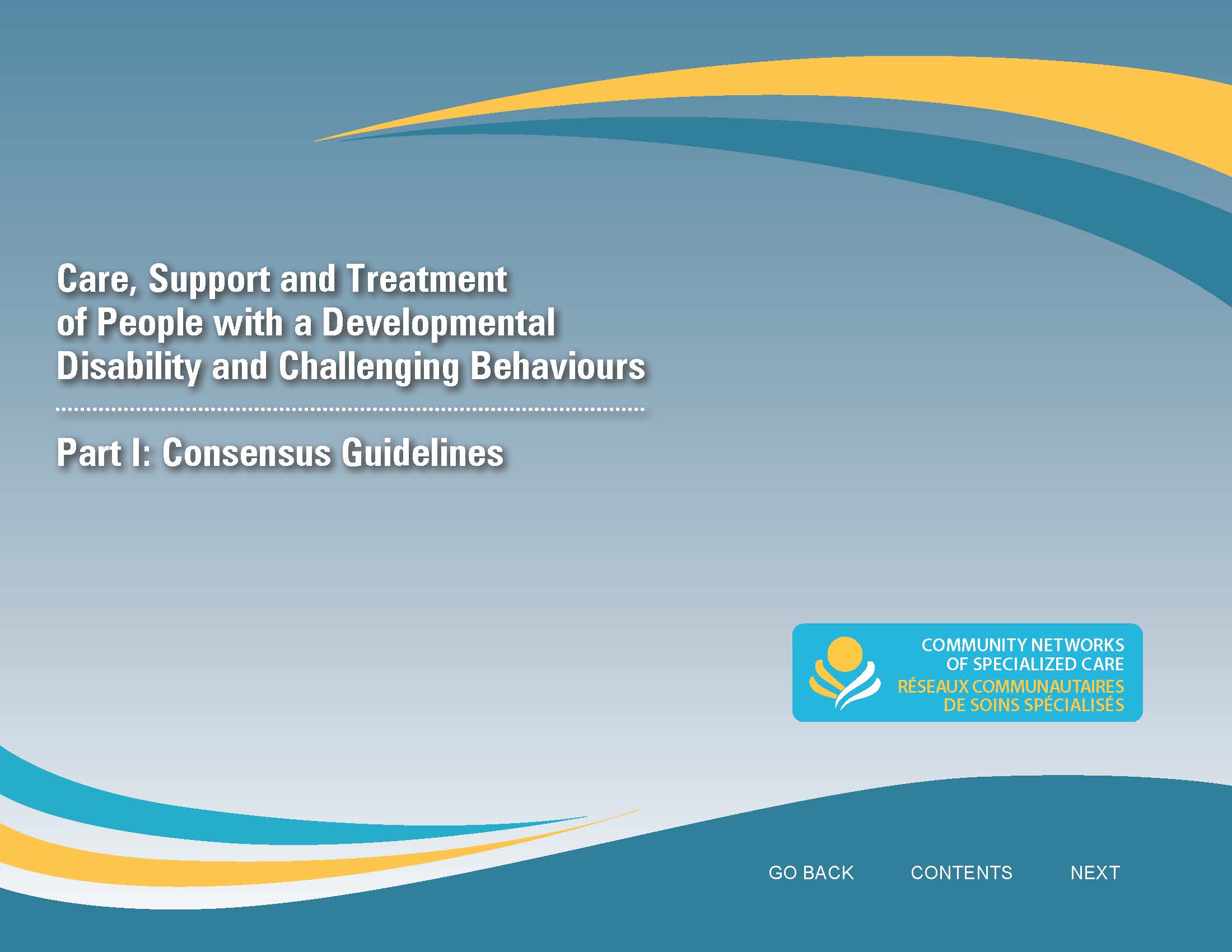Care, Support and Treatment of People with a Developmental Disability and Challenging Behaviours
Part I: Consensus Guidelines
The Community Networks of Specialized Care in Ontario developed a set of Consensus Guidelines to help families, caregivers and agencies in the daily care, support and treatment of adults with both a developmental disability and challenging behaviours. You can find more information by viewing Part I: Consensus Guidelines, or go straight to Part II below for helpful tools and resources.
*Note: Please update your system to ensure the best experience*
Part II: Tools and Resources
Helpful tools and resources to support dialogues and training regarding the Care, Support and Treatment of People with a Developmental Disability and Challenging Behaviours.
Consensus Guidelines Overview
Care, Support and Treatment of People with a Developmental Disability and Challenging Behaviours Presentation
A Prezi Presentation that provides an overview of the Consensus Guidelines
Guiding Principles
Consensus Guidelines – Capacity Building Checklist
A tool to assist support teams in considering each guideline as it applies to their supports to a person exhibiting challenging behaviour.
Informed Voluntary Consent Checklist
A tool designed for primary care providers to assist in securing informed consent. This includes determining capacity, obtaining and documenting informed voluntary consent, obtaining consent from a Substitute Decision Maker and obtaining consent from incapable patients in various medical situations.
Bio-Psycho-Social
A Guide to Understanding Behavioural Problems and Emotional Concerns Part A: Primary Care Provider Section and Part B: Caregiver Section
A guide for primary care providers to help identify the causes of behavioural problems in order to plan for treatment and management and prevent reoccurrence.
Adaptive Functioning and Communication Associated with Different Levels of Developmental Disabilities
A tool to assist in understanding the adaptive functioning and communication presentation of persons with developmental disabilities diagnosed in the mild, moderate, severe and profound range of intellectual functioning.
Antecedent Behaviour and Consequences Recording Chart
A tool that assists in organizing an understanding of the conditions that proceed and follow behaviour.
Behaviour Support Plan Reference Guide
A Ministry of Community and Social Services resource that provides information to help clarify behaviour support plan requirements as outlined in Quality Assurance Measures and Policy Directive 2.0
Bio-Psycho-Social Model Formulation Grid
A tool to assist in understanding and addressing biological, psychological and social factors that may be influencing behaviour. The tool considers factors that are predisposing, precipitating, perpetuating and protective.
Bio-Psycho-Social Wrap Around Video
A tool to assist in understanding biological, psychological and social factors that may be influencing behaviour.
NTG – Early Detection Screen for Dementia
A tool for caregivers to record their observations regarding changes in areas of cognitive and adaptive functioning known to be associated with dementia.
Risk Assessment Tool for Adults with Developmental Disabilities in Behavioural Crisis
A tool to assist in considering caregiver/environmental and DD specific factors for the following risk areas; suicide, self-harm, self-neglect, victimization or exploitation, risk to others and risk to environment.
Collaboration and Training
Primary Care Guidelines Tool Kit
Tools developed to assist primary care providers (general practitioners, family physicians, nurses, nurse practitioners) in caring for adults with DD by helping them to implement various recommendations in Primary care of adults with developmental disabilities: Canadian consensus guidelines (DD Guidelines).
Resiliency Check-in Exercise
A self-assessment tool to determine one’s current emotional state prior to beginning work